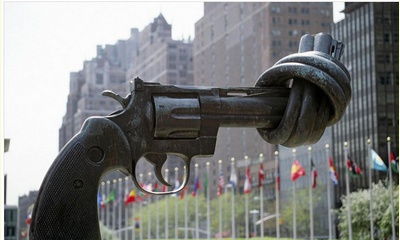|
|
Honouring Gandhi’s legacy, Deputy Secretary-General reaffirms power of peaceful protest
un articulo por UN News Centre
In these dramatic and perilous times, United Nations Deputy
Secretary-General Jan Eliasson urged the international community
to reaffirm the power and potential of bringing about change
through peaceful means, following in the footsteps of Mahatma
Gandhi, who inspired today’s International Day of Non-Violence [2
October 2014]. 
“Non-Violence,” a sculpture by Karl Fredrik Reutersward, sits permanently outside UN Headquarters in New York
click on photo to enlarge
“The response to violence is all too often more violence when, in
fact, reconciliation and dialogue is needed,” Mr. Eliasson said in a
special event for the occasion, held at UN Headquarters in New
York.
He called for embracing the fundamental values embodied by Mr.
Gandhi: passion, compassion, and belief in the dignity and equal
worth of all human beings. Mr. Eliasson recalled Mr. Gandhi’s
warning that “an eye for an eye ends up making the whole world
blind.”
The International Day, marked annually on Mr. Gandhi’s birthday,
celebrates his non-violent philosophy and tactics have been
adopted by leaders around the world. It was established by the
General Assembly as an occasion to “disseminate the message of
non-violence, including through education and public awareness,”
and has been observed annually since 2007.
Mr. Gandhi’s historic “Salt March” against unfair colonial taxation,
and his other non-violent resistance inspired change in countries
from the Georgia to South Africa, Northern Ireland and the United
States, Mr. Eliasson said.
This year’s event is particularly relevant given the resurgence of
exceptionalism and sectarianism in parts of the world, the senior
UN official said. He added that many minorities find themselves
under attack, and civilizations are being displaced as conflicts force
them to flee.
“We must reject violence as the futile and default means to bring
about change,” Mr. Eliasson said. “We must embrace the path to
non-violence and peaceful settlements as the road to sustainable
and equitable transformations of societies.”
The UN is strengthening its efforts to bring non-violence to
concrete action through preventive diplomacy and the recent
“Human Rights up Front” initiative which highlights the need for
early action, and the crucial role of responding early to human
rights violations.
In his message Secretary-General Ban Ki-moon said principles
enshrined in the Universal Declaration of Human Rights, adopted in
1948, the year of Gandhi’s death, owe much to Mr Ghandi’s beliefs.
At this time of increased sectarian violence and the wanton
destruction of cultural sites and heritage, “We have to foster a
culture of peace, built on dialogue and understanding, for living
together in harmony while respecting and celebrating humanity’s
rich diversity,” the UN chief said.
Stressing that there is no greater tool than education to enhance
human dignity, promote a culture of non-violence, and build lasting
peace, Mr. Ban said: “Through education, we can craft new ways of
living with each other and the planet. Education can also lay the
foundation for developing new forms of global citizenship and
solidarity that are so essential in today’s world.”
|








|
DISCUSSION
Pregunta(s) relacionada(s) al artículo :
What is the message to us today from Mahatma Gandhi?,
* * * * *
Comentario más reciente:
:
Gandhi gives us so many lessons, we should spend our lives learning them. Here are just some examples that have influenced me.
I discovered in the earliest stages that pursuit of truth did not admit of violence being inflicted on one's opponent but that he must be weaned from error by patience and sympathy.
In fact, Gandhi teaches us that there are no enemies, only opponents whom we have yet to convince of the truth. And what is truth?
Gandhi teaches us that truth is a mountain:
There are many paths to Truth, many relative truths, many diverse paths or ways to climb the mountain.
I think of this lesson when I meet others whose path I do not understand at first. Are there places where our paths cross as we climb the mountain?
Hate the sin but not the sinner
We must never reject the person, but rather criticize their actions if we think they are harmful and try to change their behavior. Again, no one is our enemy, even if they are in conflict with us. It is a question of trying to understand and transform the conflict. And what should be our motivation? Why not anger?
I have learned through bitter experience the one supreme lesson to conserve my anger, and as heat conserved is transmitted into energy, even so our anger controlled can be transmitted into a power that can move the world.
Anger is the natural human response to injustice; Let us learn from the child who cries out in frustration: "That's not fair!"

|
|









